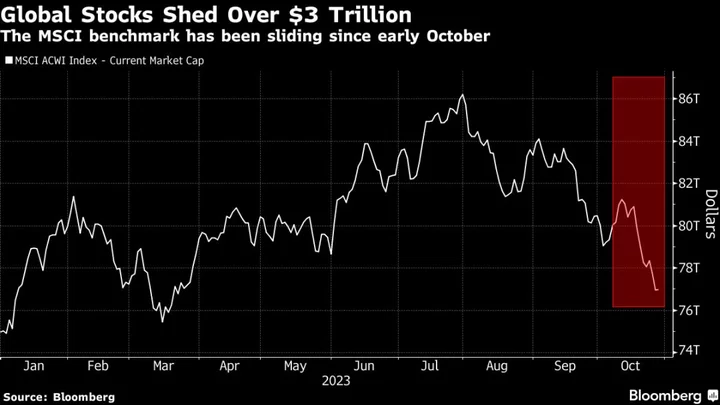The expansion of Israel’s ground operations in Gaza added more pressure to global markets as investors prepare for a busy week packed with major central bank decisions and a high-stakes announcement of US bond sales.
Middle Eastern markets that opened on Sunday showed little sign of panic a day after Israel sent troops and tanks into the northern Gaza Strip. Israel’s TA-35 stock index rose 1.1% as of 2 p.m. in Tel Aviv, trimming its loss to 11% since the Hamas infiltration on Oct. 7. A clearer indication will come once major currencies and futures start trading in Australia and Asia in the early afternoon hours in the US.
Historically, major price swings tend to be short-lived as geopolitical risks shift. But the possibility that the conflict ends up drawing in nations such as Iran and even the US may send oil prices soaring and sap investors’ risk appetite. The global stock market has already lost $12 trillion in value since the end of July as concern mounts that central banks’ “higher-for-longer” interest-rate policies may tip the global economy toward a recession.
“Markets face a very challenging backdrop at this juncture,” said Paul de La Baume, investment adviser at BNP Paribas (Suisse) SA. “Geopolitical events are adding more volatility and reducing visibility.”
Israel said it had hit hundreds of Hamas targets, including missile-launch posts, with Prime Minister Benjamin Netanyahu warning Saturday of a “long and difficult” war.
The Middle East supplies about a third of the world’s oil. West Texas Intermediate surged as much as 3.2% Friday to trade above $85 a barrel. It remains below its highest point since the conflict broke out — just above $90 — as so far there’s been no real impact on global supplies.
“The market has discounted a relatively moderate scenario, in which the conflict is more or less restricted to the area,” said Francisco Quintana, head of investment strategy at ING Spain. “The tension is enough to raise energy prices, put pressure on inflation, and prevent central banks from relaxing.”
Quintana warned that “the internationalization” of the conflict “would place us very close to the scenarios of 1973.” That year, members of the Organization of Petroleum Exporting Countries (OPEC) imposed an embargo against the US after the Arab-Israeli war, sending oil prices surging.
To be sure, 1970s-style stagflation remains a remote possibility. Major conflicts involving Israel and Arab neighbors in this century have had no lasting impact on oil, with crude prices unchanged in the first 100 days following the conflicts, according to Marko Papic, chief strategist at Clocktower Group.
The VIX index, known as Wall Street’s fear gauge, has increased to 21 from 13 in mid-September, but remains well below the 27 level hit in March when the collapse of several regional banks set off a market rout.
Safe Havens
Still, should tension escalate, traders and strategists said, safe-haven assets, such as gold, Swiss franc and short-dated government bonds will continue to benefit. Gold has stood out as one of the biggest winners since the war started, rising almost 10% to more than $2,000 an ounce. Commodity currencies, such as the Colombian peso and Brazilian real, have also been best performing currencies , followed by the Swiss franc.
The intensified conflict in the Middle East comes at the start of a week with a slew of potentially market-moving events, including central bank meetings in Japan, US and the UK.
On Wednesday, the US Treasury Department will unveil its quarterly bond sales plan, an announcement that may determine whether the 10-year Treasury yields have the momentum to keep rising after surging to a 16-year high last week. The week will end with the US payroll report that may show job and wage growth slowed last month.
“If you believe current events will have a lasting impact on global societies, your required risk premium will go up,” said Jeroen Blokland, head of research firm True Insights. “Even though this impact is not easily measured, it should not be overlooked. Politics and political currents are becoming more polarized and more extreme.”
--With assistance from Sagarika Jaisinghani, Vinícius Andrade, Elena Popina and Kerim Karakaya.
Author: Ye Xie and Macarena Muñoz

